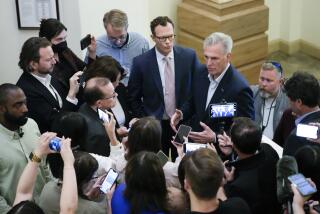Brazil Nearer Accord With Banks on Debt
- Share via
NEW YORK — A Brazilian delegation seeking to renegotiate debt repayments may be able to reach a preliminary agreement with a committee of international banks soon, the bank panel’s chairman says.
According to Citicorp, William R. Rhodes, a bank official who is chairman of the 14-bank committee, said in a speech Tuesday in Washington that the committee had “reached preliminary agreement on nearly all major items” in the talks. He said he expected an overall agreement within “a week or two,” but added it could take longer.
Under negotiation is a $62-billion debt restructuring package--the largest ever undertaken--which would cover more than half of Brazil’s $112-billion foreign debt.
Stretching Payments
According to the text of his speech, Rhodes said that if a final agreement could be worked out, it “would bring Brazil fully current on interest payments to commercial banks.”
“For the past month,” Rhodes told the Council of the Americas in Washington. “I have been estimating that we would complete our negotiations on a preliminary agreement within a week or so. We’re breaking new ground in some areas, which makes predictions on timing difficult. However, we are very close.”
Rhodes said the negotiators were working on stretching out payments due on $62 million in debt over the next 20 years rather than the eight years called for under the original loans.
Focal Point of Debt
The points agreed to so far, Rhodes said, include new loans totaling $5.2 billion to cover Brazilian external financing for 1987 through the first half of 1989.
He said the World Bank’s participation in the package will be significant and the most extensive since the package negotiated with Mexico in 1986 and will include substantial co-financing of commercial bank loans.
Rhodes noted that “Brazil has been the focal point of the debt crisis for the last year or so,” beginning with its moratorium on interest payments to commercials banks declared in February, 1987.
He said that “some economists estimate that the moratorium cost the country at least one to two billion dollars” when the banks retaliated by cutting off short-term credits and taking other measures.
More to Read
Sign up for Essential California
The most important California stories and recommendations in your inbox every morning.
You may occasionally receive promotional content from the Los Angeles Times.












